CLWM4000 Business and Corporations Law: Case Study Analysis Report
VerifiedAdded on 2022/08/21
|10
|2957
|10
Case Study
AI Summary
This case study analyzes a legal dispute between Mr. David Miller and Ms. Georgia McKenzie, a Certified Practising Accountant. Mr. Miller sought to maximize his tax deductions and provided Ms. McKenzie with business details, including receipts. Ms. McKenzie advised including family expenses, leading to a tax evasion charge against Mr. Miller. The analysis focuses on contract law principles, including offer, acceptance, intention, and consideration, as well as elements of a valid contract like capacity and free consent. It explores fraudulent misrepresentation, the Australian Consumer Law, and the consequences of tax evasion. The case examines whether the contract between Miller and McKenzie is valid, if Miller can claim damages for McKenzie's advice, and if McKenzie is guilty of breach of duty, fraud, or misrepresentation under Australian law. It also addresses contributory negligence and potential consequences for McKenzie's CPA certification. The case highlights the implications of misleading and deceptive conduct under the Australian Consumer Law and the potential for penalties and contract invalidation.
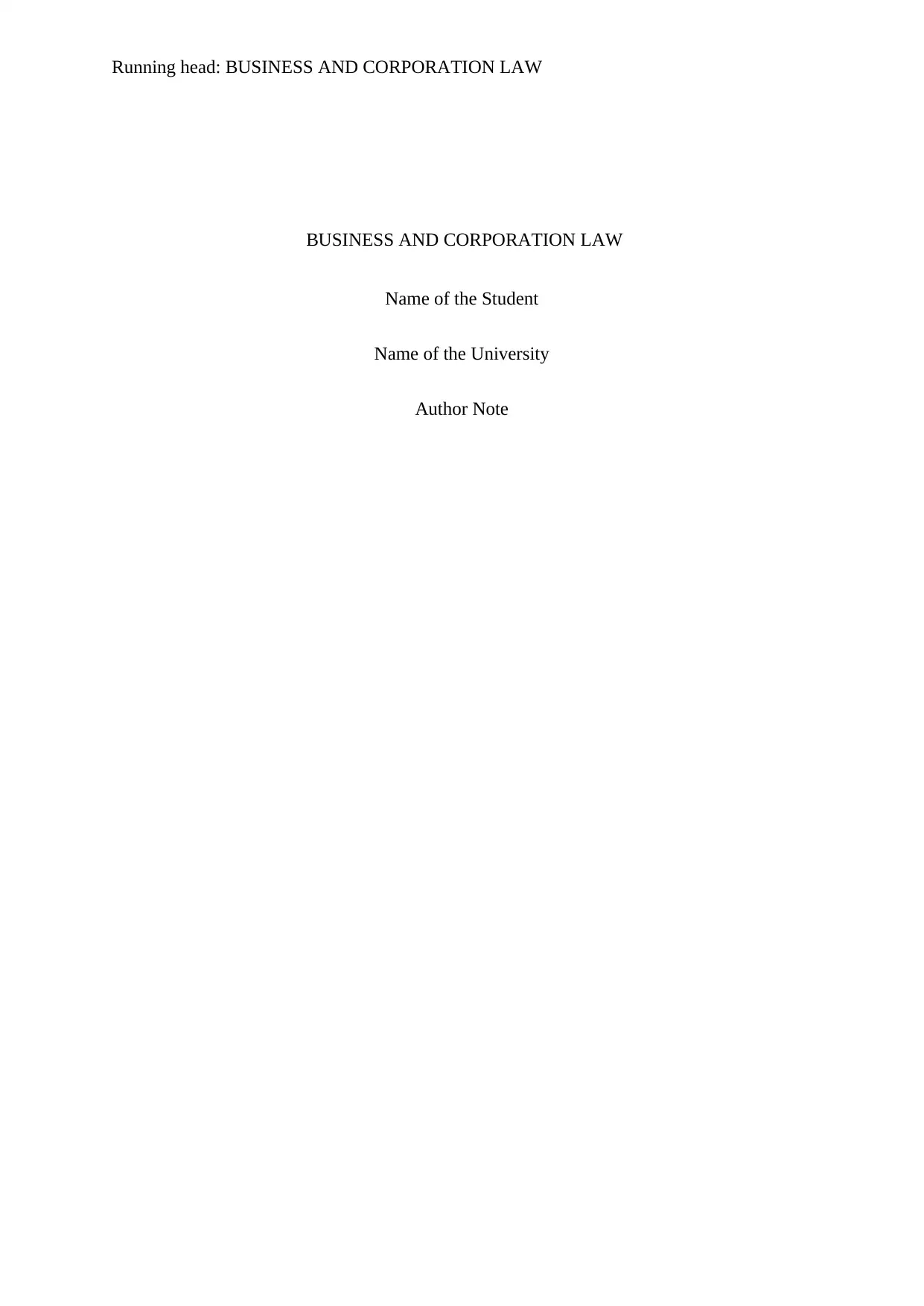
Running head: BUSINESS AND CORPORATION LAW
BUSINESS AND CORPORATION LAW
Name of the Student
Name of the University
Author Note
BUSINESS AND CORPORATION LAW
Name of the Student
Name of the University
Author Note
Paraphrase This Document
Need a fresh take? Get an instant paraphrase of this document with our AI Paraphraser
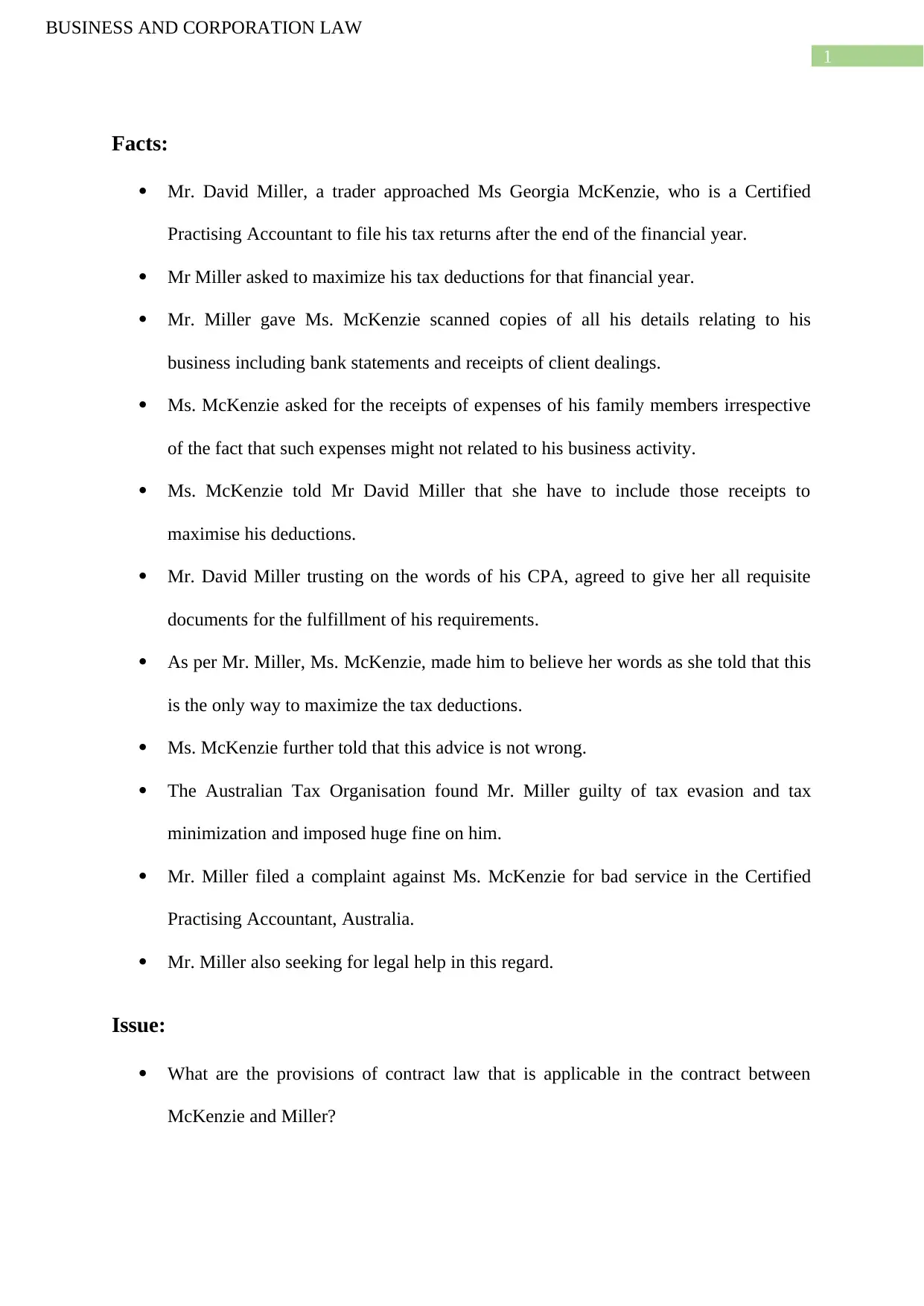
1
BUSINESS AND CORPORATION LAW
Facts:
Mr. David Miller, a trader approached Ms Georgia McKenzie, who is a Certified
Practising Accountant to file his tax returns after the end of the financial year.
Mr Miller asked to maximize his tax deductions for that financial year.
Mr. Miller gave Ms. McKenzie scanned copies of all his details relating to his
business including bank statements and receipts of client dealings.
Ms. McKenzie asked for the receipts of expenses of his family members irrespective
of the fact that such expenses might not related to his business activity.
Ms. McKenzie told Mr David Miller that she have to include those receipts to
maximise his deductions.
Mr. David Miller trusting on the words of his CPA, agreed to give her all requisite
documents for the fulfillment of his requirements.
As per Mr. Miller, Ms. McKenzie, made him to believe her words as she told that this
is the only way to maximize the tax deductions.
Ms. McKenzie further told that this advice is not wrong.
The Australian Tax Organisation found Mr. Miller guilty of tax evasion and tax
minimization and imposed huge fine on him.
Mr. Miller filed a complaint against Ms. McKenzie for bad service in the Certified
Practising Accountant, Australia.
Mr. Miller also seeking for legal help in this regard.
Issue:
What are the provisions of contract law that is applicable in the contract between
McKenzie and Miller?
BUSINESS AND CORPORATION LAW
Facts:
Mr. David Miller, a trader approached Ms Georgia McKenzie, who is a Certified
Practising Accountant to file his tax returns after the end of the financial year.
Mr Miller asked to maximize his tax deductions for that financial year.
Mr. Miller gave Ms. McKenzie scanned copies of all his details relating to his
business including bank statements and receipts of client dealings.
Ms. McKenzie asked for the receipts of expenses of his family members irrespective
of the fact that such expenses might not related to his business activity.
Ms. McKenzie told Mr David Miller that she have to include those receipts to
maximise his deductions.
Mr. David Miller trusting on the words of his CPA, agreed to give her all requisite
documents for the fulfillment of his requirements.
As per Mr. Miller, Ms. McKenzie, made him to believe her words as she told that this
is the only way to maximize the tax deductions.
Ms. McKenzie further told that this advice is not wrong.
The Australian Tax Organisation found Mr. Miller guilty of tax evasion and tax
minimization and imposed huge fine on him.
Mr. Miller filed a complaint against Ms. McKenzie for bad service in the Certified
Practising Accountant, Australia.
Mr. Miller also seeking for legal help in this regard.
Issue:
What are the provisions of contract law that is applicable in the contract between
McKenzie and Miller?
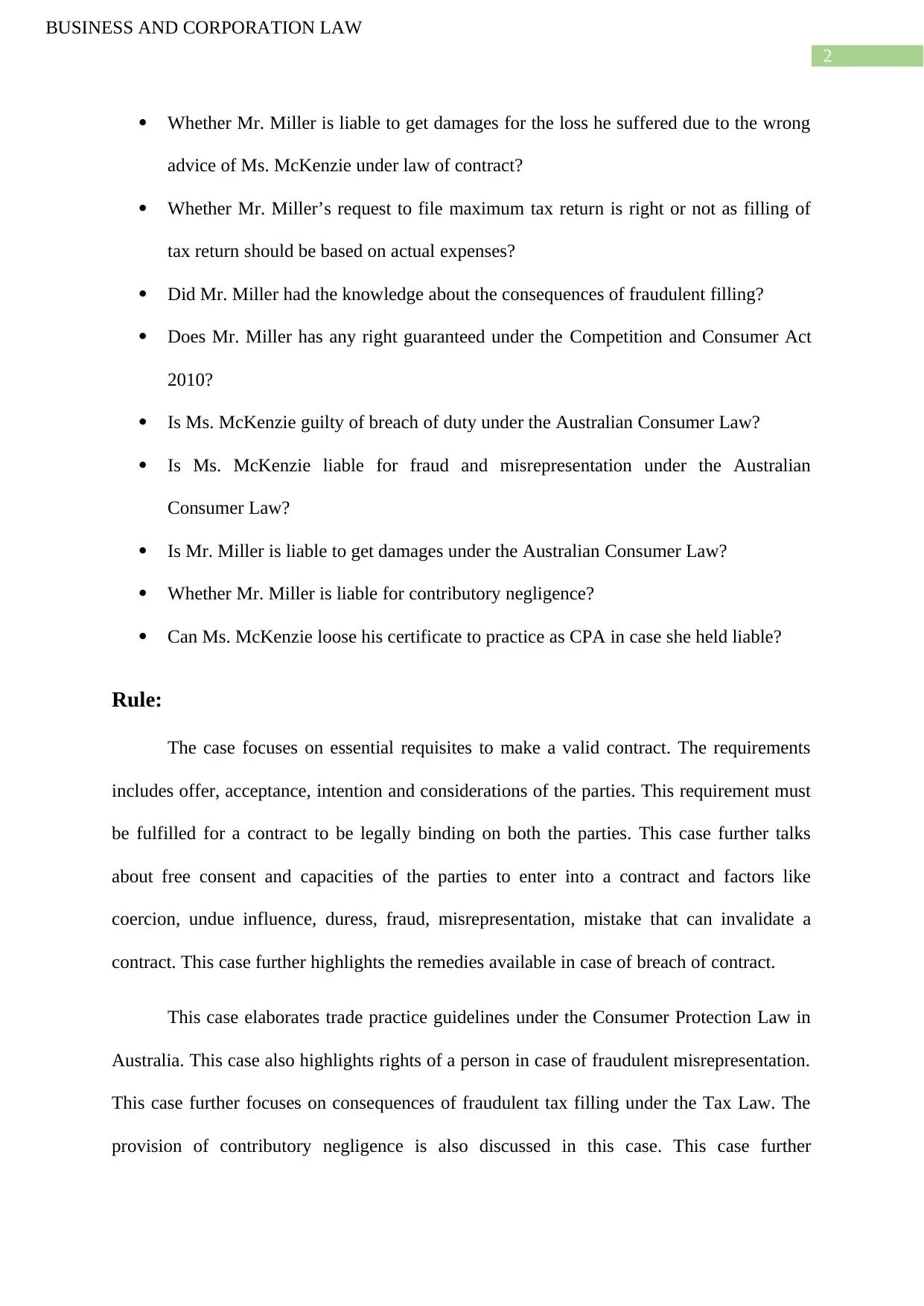
2
BUSINESS AND CORPORATION LAW
Whether Mr. Miller is liable to get damages for the loss he suffered due to the wrong
advice of Ms. McKenzie under law of contract?
Whether Mr. Miller’s request to file maximum tax return is right or not as filling of
tax return should be based on actual expenses?
Did Mr. Miller had the knowledge about the consequences of fraudulent filling?
Does Mr. Miller has any right guaranteed under the Competition and Consumer Act
2010?
Is Ms. McKenzie guilty of breach of duty under the Australian Consumer Law?
Is Ms. McKenzie liable for fraud and misrepresentation under the Australian
Consumer Law?
Is Mr. Miller is liable to get damages under the Australian Consumer Law?
Whether Mr. Miller is liable for contributory negligence?
Can Ms. McKenzie loose his certificate to practice as CPA in case she held liable?
Rule:
The case focuses on essential requisites to make a valid contract. The requirements
includes offer, acceptance, intention and considerations of the parties. This requirement must
be fulfilled for a contract to be legally binding on both the parties. This case further talks
about free consent and capacities of the parties to enter into a contract and factors like
coercion, undue influence, duress, fraud, misrepresentation, mistake that can invalidate a
contract. This case further highlights the remedies available in case of breach of contract.
This case elaborates trade practice guidelines under the Consumer Protection Law in
Australia. This case also highlights rights of a person in case of fraudulent misrepresentation.
This case further focuses on consequences of fraudulent tax filling under the Tax Law. The
provision of contributory negligence is also discussed in this case. This case further
BUSINESS AND CORPORATION LAW
Whether Mr. Miller is liable to get damages for the loss he suffered due to the wrong
advice of Ms. McKenzie under law of contract?
Whether Mr. Miller’s request to file maximum tax return is right or not as filling of
tax return should be based on actual expenses?
Did Mr. Miller had the knowledge about the consequences of fraudulent filling?
Does Mr. Miller has any right guaranteed under the Competition and Consumer Act
2010?
Is Ms. McKenzie guilty of breach of duty under the Australian Consumer Law?
Is Ms. McKenzie liable for fraud and misrepresentation under the Australian
Consumer Law?
Is Mr. Miller is liable to get damages under the Australian Consumer Law?
Whether Mr. Miller is liable for contributory negligence?
Can Ms. McKenzie loose his certificate to practice as CPA in case she held liable?
Rule:
The case focuses on essential requisites to make a valid contract. The requirements
includes offer, acceptance, intention and considerations of the parties. This requirement must
be fulfilled for a contract to be legally binding on both the parties. This case further talks
about free consent and capacities of the parties to enter into a contract and factors like
coercion, undue influence, duress, fraud, misrepresentation, mistake that can invalidate a
contract. This case further highlights the remedies available in case of breach of contract.
This case elaborates trade practice guidelines under the Consumer Protection Law in
Australia. This case also highlights rights of a person in case of fraudulent misrepresentation.
This case further focuses on consequences of fraudulent tax filling under the Tax Law. The
provision of contributory negligence is also discussed in this case. This case further
⊘ This is a preview!⊘
Do you want full access?
Subscribe today to unlock all pages.

Trusted by 1+ million students worldwide
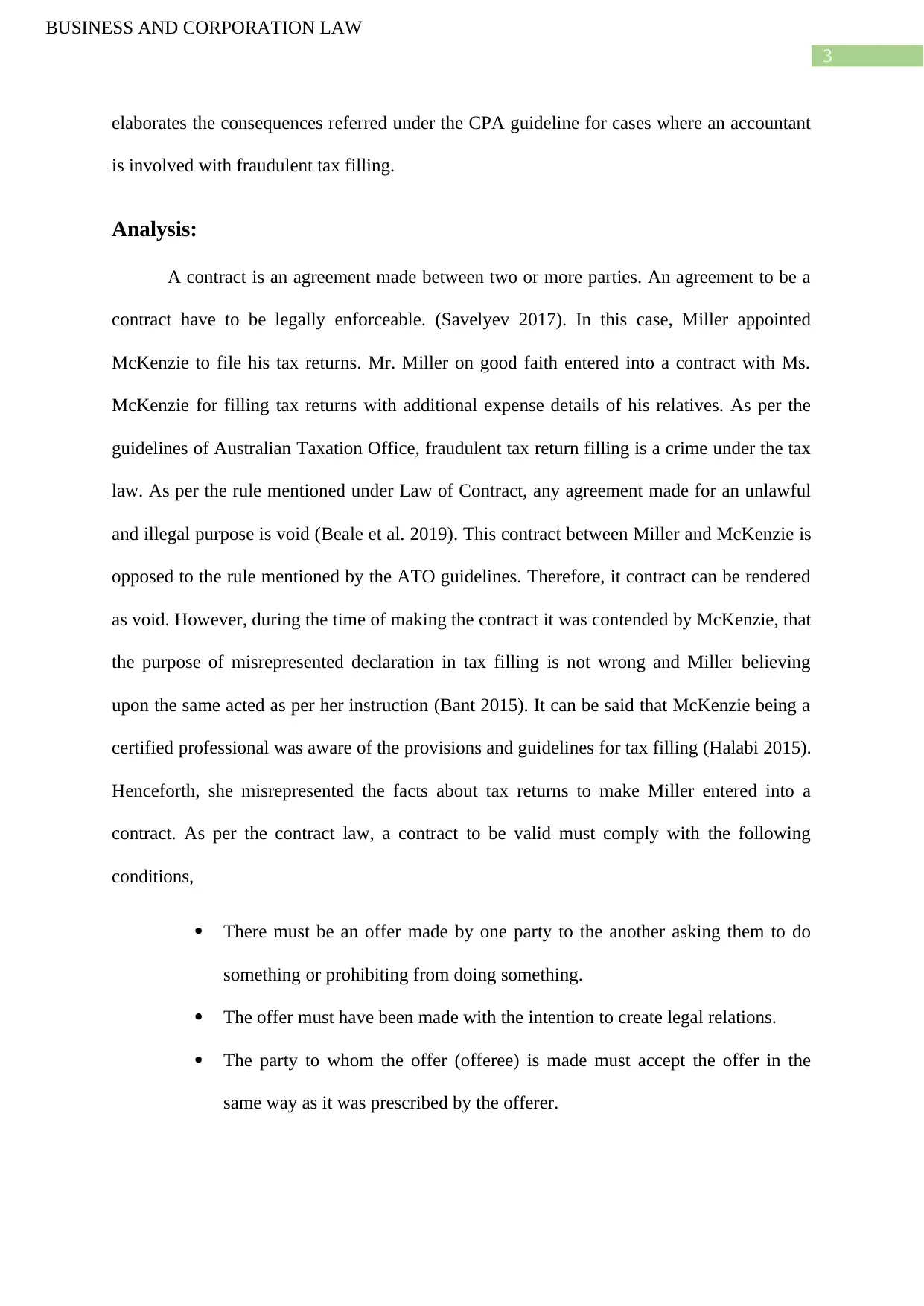
3
BUSINESS AND CORPORATION LAW
elaborates the consequences referred under the CPA guideline for cases where an accountant
is involved with fraudulent tax filling.
Analysis:
A contract is an agreement made between two or more parties. An agreement to be a
contract have to be legally enforceable. (Savelyev 2017). In this case, Miller appointed
McKenzie to file his tax returns. Mr. Miller on good faith entered into a contract with Ms.
McKenzie for filling tax returns with additional expense details of his relatives. As per the
guidelines of Australian Taxation Office, fraudulent tax return filling is a crime under the tax
law. As per the rule mentioned under Law of Contract, any agreement made for an unlawful
and illegal purpose is void (Beale et al. 2019). This contract between Miller and McKenzie is
opposed to the rule mentioned by the ATO guidelines. Therefore, it contract can be rendered
as void. However, during the time of making the contract it was contended by McKenzie, that
the purpose of misrepresented declaration in tax filling is not wrong and Miller believing
upon the same acted as per her instruction (Bant 2015). It can be said that McKenzie being a
certified professional was aware of the provisions and guidelines for tax filling (Halabi 2015).
Henceforth, she misrepresented the facts about tax returns to make Miller entered into a
contract. As per the contract law, a contract to be valid must comply with the following
conditions,
There must be an offer made by one party to the another asking them to do
something or prohibiting from doing something.
The offer must have been made with the intention to create legal relations.
The party to whom the offer (offeree) is made must accept the offer in the
same way as it was prescribed by the offerer.
BUSINESS AND CORPORATION LAW
elaborates the consequences referred under the CPA guideline for cases where an accountant
is involved with fraudulent tax filling.
Analysis:
A contract is an agreement made between two or more parties. An agreement to be a
contract have to be legally enforceable. (Savelyev 2017). In this case, Miller appointed
McKenzie to file his tax returns. Mr. Miller on good faith entered into a contract with Ms.
McKenzie for filling tax returns with additional expense details of his relatives. As per the
guidelines of Australian Taxation Office, fraudulent tax return filling is a crime under the tax
law. As per the rule mentioned under Law of Contract, any agreement made for an unlawful
and illegal purpose is void (Beale et al. 2019). This contract between Miller and McKenzie is
opposed to the rule mentioned by the ATO guidelines. Therefore, it contract can be rendered
as void. However, during the time of making the contract it was contended by McKenzie, that
the purpose of misrepresented declaration in tax filling is not wrong and Miller believing
upon the same acted as per her instruction (Bant 2015). It can be said that McKenzie being a
certified professional was aware of the provisions and guidelines for tax filling (Halabi 2015).
Henceforth, she misrepresented the facts about tax returns to make Miller entered into a
contract. As per the contract law, a contract to be valid must comply with the following
conditions,
There must be an offer made by one party to the another asking them to do
something or prohibiting from doing something.
The offer must have been made with the intention to create legal relations.
The party to whom the offer (offeree) is made must accept the offer in the
same way as it was prescribed by the offerer.
Paraphrase This Document
Need a fresh take? Get an instant paraphrase of this document with our AI Paraphraser
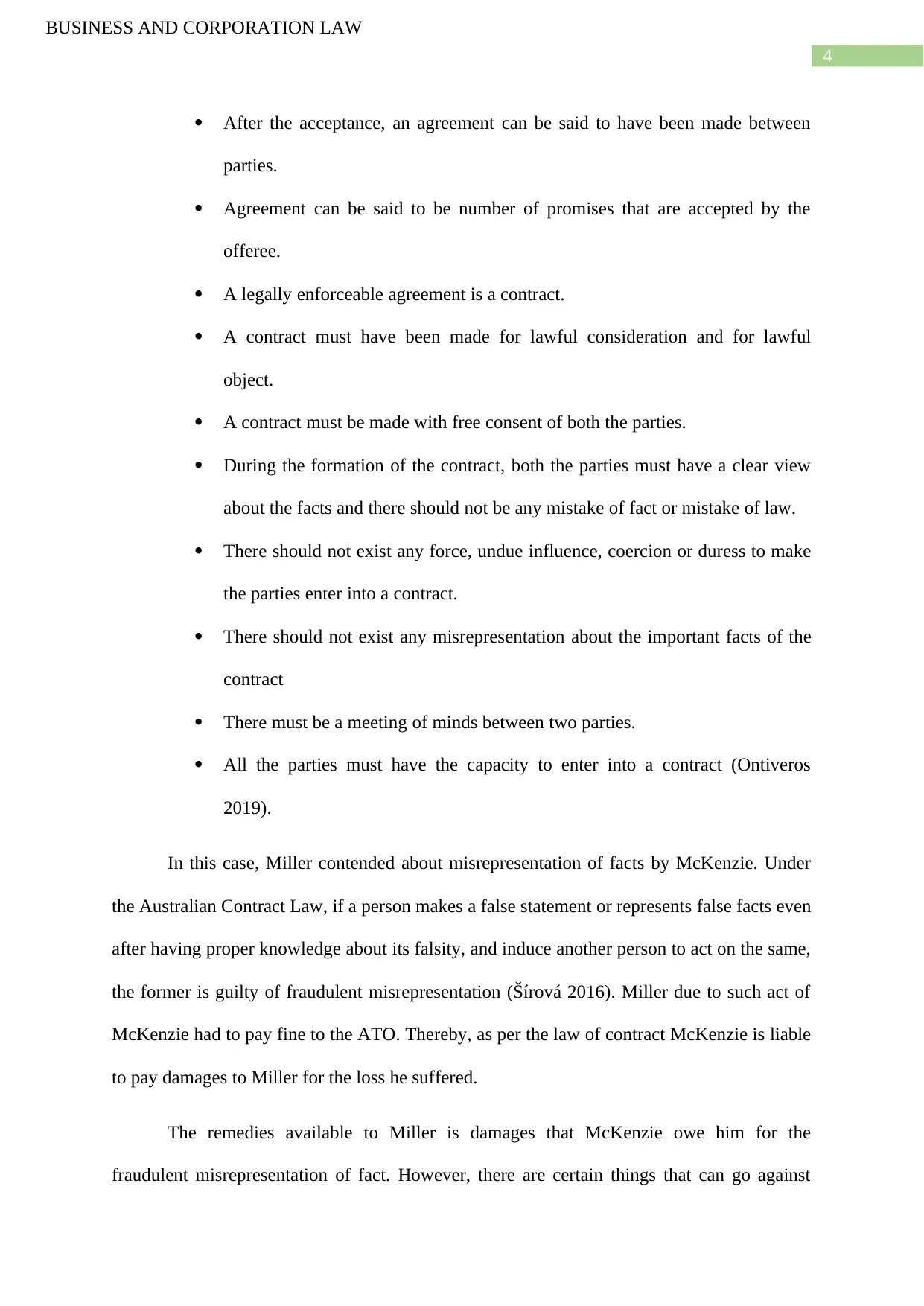
4
BUSINESS AND CORPORATION LAW
After the acceptance, an agreement can be said to have been made between
parties.
Agreement can be said to be number of promises that are accepted by the
offeree.
A legally enforceable agreement is a contract.
A contract must have been made for lawful consideration and for lawful
object.
A contract must be made with free consent of both the parties.
During the formation of the contract, both the parties must have a clear view
about the facts and there should not be any mistake of fact or mistake of law.
There should not exist any force, undue influence, coercion or duress to make
the parties enter into a contract.
There should not exist any misrepresentation about the important facts of the
contract
There must be a meeting of minds between two parties.
All the parties must have the capacity to enter into a contract (Ontiveros
2019).
In this case, Miller contended about misrepresentation of facts by McKenzie. Under
the Australian Contract Law, if a person makes a false statement or represents false facts even
after having proper knowledge about its falsity, and induce another person to act on the same,
the former is guilty of fraudulent misrepresentation (Šírová 2016). Miller due to such act of
McKenzie had to pay fine to the ATO. Thereby, as per the law of contract McKenzie is liable
to pay damages to Miller for the loss he suffered.
The remedies available to Miller is damages that McKenzie owe him for the
fraudulent misrepresentation of fact. However, there are certain things that can go against
BUSINESS AND CORPORATION LAW
After the acceptance, an agreement can be said to have been made between
parties.
Agreement can be said to be number of promises that are accepted by the
offeree.
A legally enforceable agreement is a contract.
A contract must have been made for lawful consideration and for lawful
object.
A contract must be made with free consent of both the parties.
During the formation of the contract, both the parties must have a clear view
about the facts and there should not be any mistake of fact or mistake of law.
There should not exist any force, undue influence, coercion or duress to make
the parties enter into a contract.
There should not exist any misrepresentation about the important facts of the
contract
There must be a meeting of minds between two parties.
All the parties must have the capacity to enter into a contract (Ontiveros
2019).
In this case, Miller contended about misrepresentation of facts by McKenzie. Under
the Australian Contract Law, if a person makes a false statement or represents false facts even
after having proper knowledge about its falsity, and induce another person to act on the same,
the former is guilty of fraudulent misrepresentation (Šírová 2016). Miller due to such act of
McKenzie had to pay fine to the ATO. Thereby, as per the law of contract McKenzie is liable
to pay damages to Miller for the loss he suffered.
The remedies available to Miller is damages that McKenzie owe him for the
fraudulent misrepresentation of fact. However, there are certain things that can go against
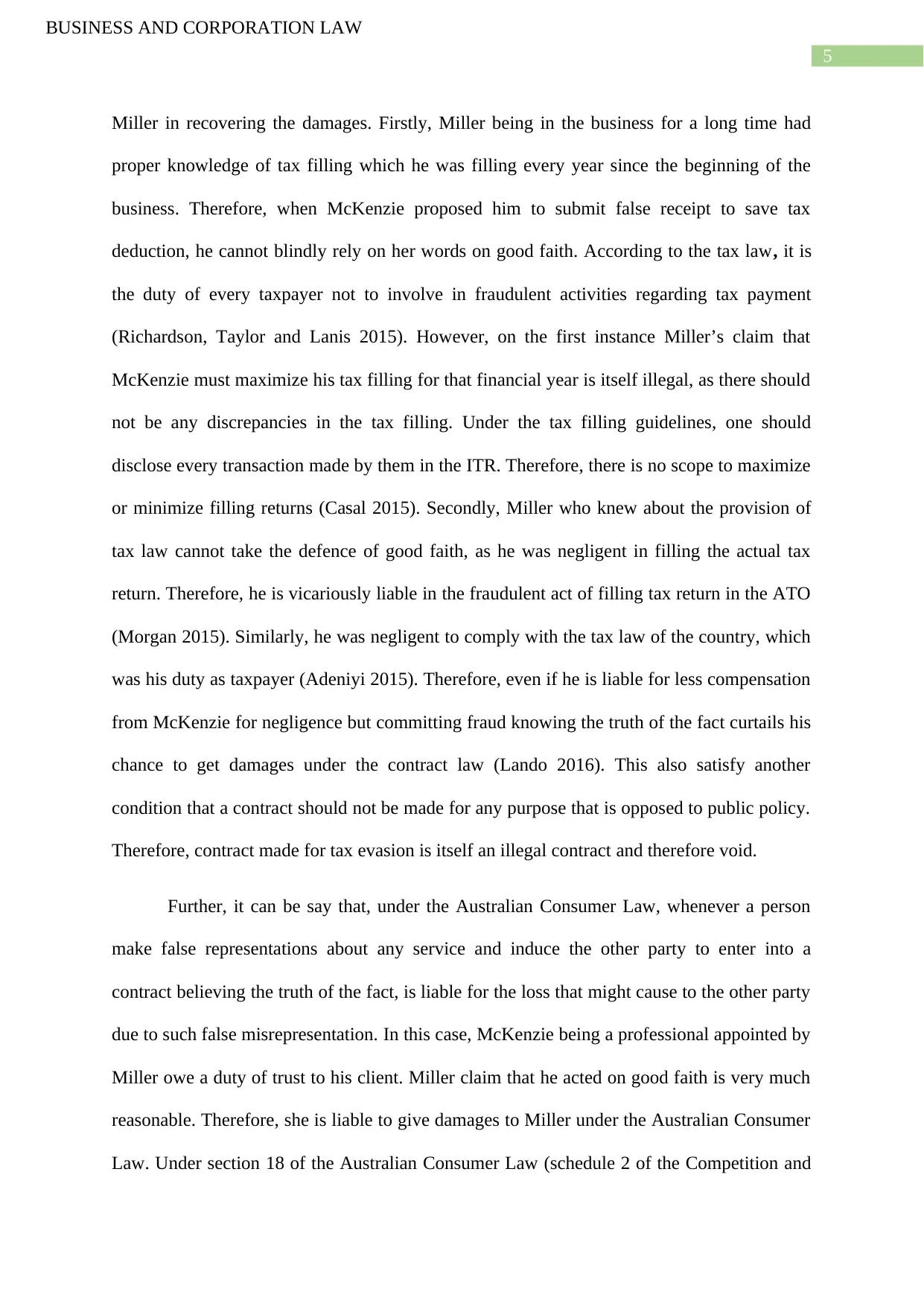
5
BUSINESS AND CORPORATION LAW
Miller in recovering the damages. Firstly, Miller being in the business for a long time had
proper knowledge of tax filling which he was filling every year since the beginning of the
business. Therefore, when McKenzie proposed him to submit false receipt to save tax
deduction, he cannot blindly rely on her words on good faith. According to the tax law, it is
the duty of every taxpayer not to involve in fraudulent activities regarding tax payment
(Richardson, Taylor and Lanis 2015). However, on the first instance Miller’s claim that
McKenzie must maximize his tax filling for that financial year is itself illegal, as there should
not be any discrepancies in the tax filling. Under the tax filling guidelines, one should
disclose every transaction made by them in the ITR. Therefore, there is no scope to maximize
or minimize filling returns (Casal 2015). Secondly, Miller who knew about the provision of
tax law cannot take the defence of good faith, as he was negligent in filling the actual tax
return. Therefore, he is vicariously liable in the fraudulent act of filling tax return in the ATO
(Morgan 2015). Similarly, he was negligent to comply with the tax law of the country, which
was his duty as taxpayer (Adeniyi 2015). Therefore, even if he is liable for less compensation
from McKenzie for negligence but committing fraud knowing the truth of the fact curtails his
chance to get damages under the contract law (Lando 2016). This also satisfy another
condition that a contract should not be made for any purpose that is opposed to public policy.
Therefore, contract made for tax evasion is itself an illegal contract and therefore void.
Further, it can be say that, under the Australian Consumer Law, whenever a person
make false representations about any service and induce the other party to enter into a
contract believing the truth of the fact, is liable for the loss that might cause to the other party
due to such false misrepresentation. In this case, McKenzie being a professional appointed by
Miller owe a duty of trust to his client. Miller claim that he acted on good faith is very much
reasonable. Therefore, she is liable to give damages to Miller under the Australian Consumer
Law. Under section 18 of the Australian Consumer Law (schedule 2 of the Competition and
BUSINESS AND CORPORATION LAW
Miller in recovering the damages. Firstly, Miller being in the business for a long time had
proper knowledge of tax filling which he was filling every year since the beginning of the
business. Therefore, when McKenzie proposed him to submit false receipt to save tax
deduction, he cannot blindly rely on her words on good faith. According to the tax law, it is
the duty of every taxpayer not to involve in fraudulent activities regarding tax payment
(Richardson, Taylor and Lanis 2015). However, on the first instance Miller’s claim that
McKenzie must maximize his tax filling for that financial year is itself illegal, as there should
not be any discrepancies in the tax filling. Under the tax filling guidelines, one should
disclose every transaction made by them in the ITR. Therefore, there is no scope to maximize
or minimize filling returns (Casal 2015). Secondly, Miller who knew about the provision of
tax law cannot take the defence of good faith, as he was negligent in filling the actual tax
return. Therefore, he is vicariously liable in the fraudulent act of filling tax return in the ATO
(Morgan 2015). Similarly, he was negligent to comply with the tax law of the country, which
was his duty as taxpayer (Adeniyi 2015). Therefore, even if he is liable for less compensation
from McKenzie for negligence but committing fraud knowing the truth of the fact curtails his
chance to get damages under the contract law (Lando 2016). This also satisfy another
condition that a contract should not be made for any purpose that is opposed to public policy.
Therefore, contract made for tax evasion is itself an illegal contract and therefore void.
Further, it can be say that, under the Australian Consumer Law, whenever a person
make false representations about any service and induce the other party to enter into a
contract believing the truth of the fact, is liable for the loss that might cause to the other party
due to such false misrepresentation. In this case, McKenzie being a professional appointed by
Miller owe a duty of trust to his client. Miller claim that he acted on good faith is very much
reasonable. Therefore, she is liable to give damages to Miller under the Australian Consumer
Law. Under section 18 of the Australian Consumer Law (schedule 2 of the Competition and
⊘ This is a preview!⊘
Do you want full access?
Subscribe today to unlock all pages.

Trusted by 1+ million students worldwide
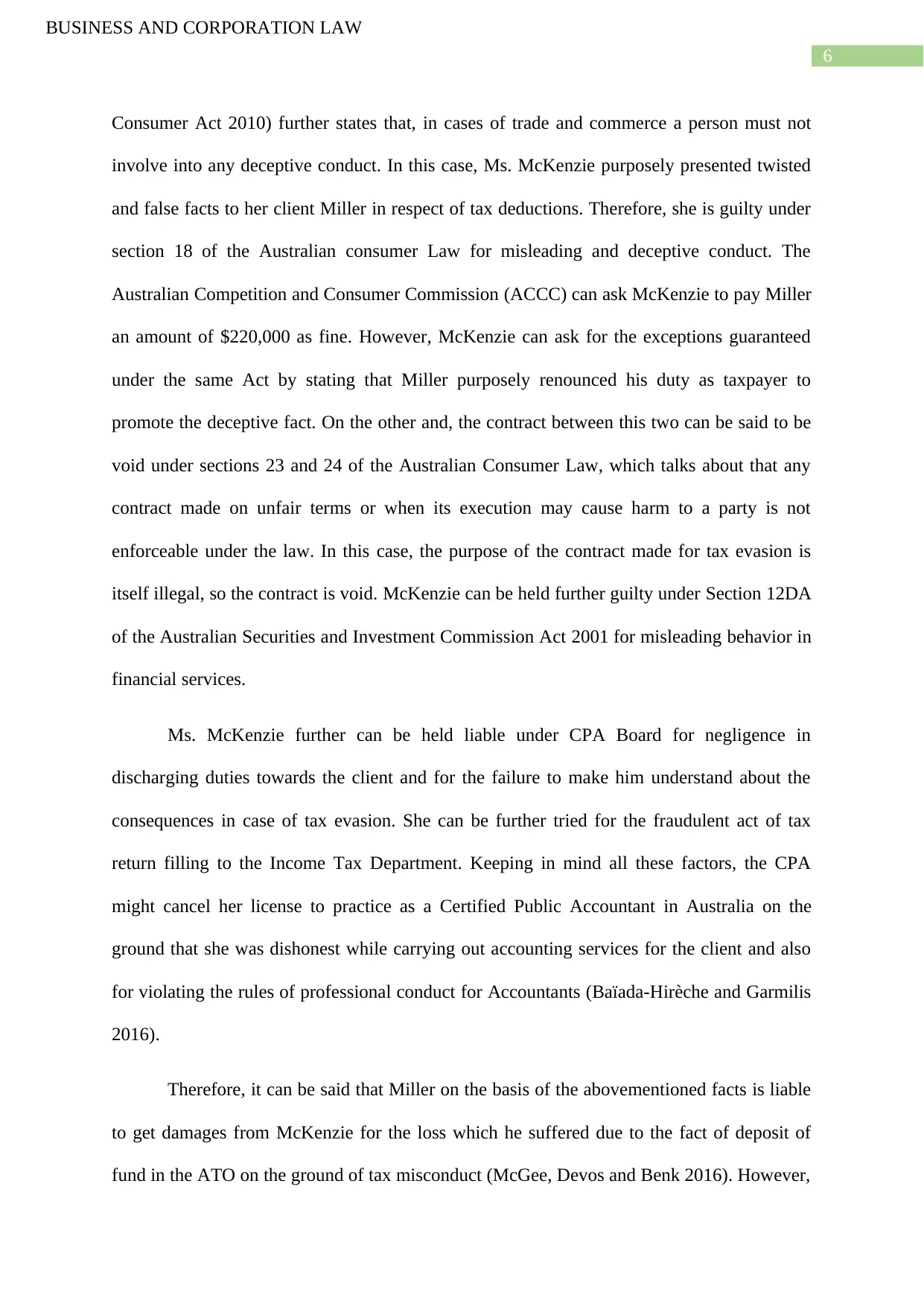
6
BUSINESS AND CORPORATION LAW
Consumer Act 2010) further states that, in cases of trade and commerce a person must not
involve into any deceptive conduct. In this case, Ms. McKenzie purposely presented twisted
and false facts to her client Miller in respect of tax deductions. Therefore, she is guilty under
section 18 of the Australian consumer Law for misleading and deceptive conduct. The
Australian Competition and Consumer Commission (ACCC) can ask McKenzie to pay Miller
an amount of $220,000 as fine. However, McKenzie can ask for the exceptions guaranteed
under the same Act by stating that Miller purposely renounced his duty as taxpayer to
promote the deceptive fact. On the other and, the contract between this two can be said to be
void under sections 23 and 24 of the Australian Consumer Law, which talks about that any
contract made on unfair terms or when its execution may cause harm to a party is not
enforceable under the law. In this case, the purpose of the contract made for tax evasion is
itself illegal, so the contract is void. McKenzie can be held further guilty under Section 12DA
of the Australian Securities and Investment Commission Act 2001 for misleading behavior in
financial services.
Ms. McKenzie further can be held liable under CPA Board for negligence in
discharging duties towards the client and for the failure to make him understand about the
consequences in case of tax evasion. She can be further tried for the fraudulent act of tax
return filling to the Income Tax Department. Keeping in mind all these factors, the CPA
might cancel her license to practice as a Certified Public Accountant in Australia on the
ground that she was dishonest while carrying out accounting services for the client and also
for violating the rules of professional conduct for Accountants (Baïada-Hirèche and Garmilis
2016).
Therefore, it can be said that Miller on the basis of the abovementioned facts is liable
to get damages from McKenzie for the loss which he suffered due to the fact of deposit of
fund in the ATO on the ground of tax misconduct (McGee, Devos and Benk 2016). However,
BUSINESS AND CORPORATION LAW
Consumer Act 2010) further states that, in cases of trade and commerce a person must not
involve into any deceptive conduct. In this case, Ms. McKenzie purposely presented twisted
and false facts to her client Miller in respect of tax deductions. Therefore, she is guilty under
section 18 of the Australian consumer Law for misleading and deceptive conduct. The
Australian Competition and Consumer Commission (ACCC) can ask McKenzie to pay Miller
an amount of $220,000 as fine. However, McKenzie can ask for the exceptions guaranteed
under the same Act by stating that Miller purposely renounced his duty as taxpayer to
promote the deceptive fact. On the other and, the contract between this two can be said to be
void under sections 23 and 24 of the Australian Consumer Law, which talks about that any
contract made on unfair terms or when its execution may cause harm to a party is not
enforceable under the law. In this case, the purpose of the contract made for tax evasion is
itself illegal, so the contract is void. McKenzie can be held further guilty under Section 12DA
of the Australian Securities and Investment Commission Act 2001 for misleading behavior in
financial services.
Ms. McKenzie further can be held liable under CPA Board for negligence in
discharging duties towards the client and for the failure to make him understand about the
consequences in case of tax evasion. She can be further tried for the fraudulent act of tax
return filling to the Income Tax Department. Keeping in mind all these factors, the CPA
might cancel her license to practice as a Certified Public Accountant in Australia on the
ground that she was dishonest while carrying out accounting services for the client and also
for violating the rules of professional conduct for Accountants (Baïada-Hirèche and Garmilis
2016).
Therefore, it can be said that Miller on the basis of the abovementioned facts is liable
to get damages from McKenzie for the loss which he suffered due to the fact of deposit of
fund in the ATO on the ground of tax misconduct (McGee, Devos and Benk 2016). However,
Paraphrase This Document
Need a fresh take? Get an instant paraphrase of this document with our AI Paraphraser
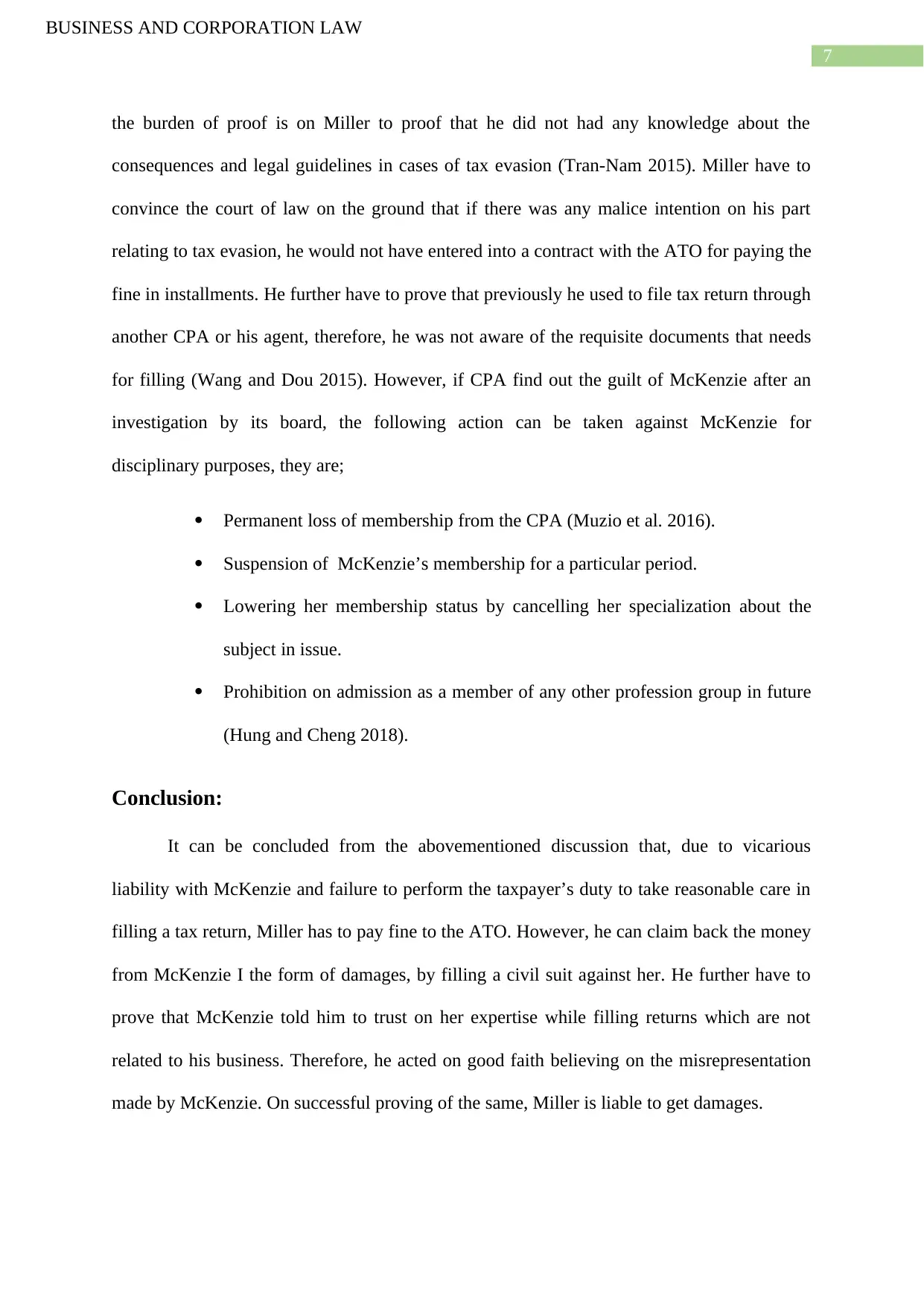
7
BUSINESS AND CORPORATION LAW
the burden of proof is on Miller to proof that he did not had any knowledge about the
consequences and legal guidelines in cases of tax evasion (Tran-Nam 2015). Miller have to
convince the court of law on the ground that if there was any malice intention on his part
relating to tax evasion, he would not have entered into a contract with the ATO for paying the
fine in installments. He further have to prove that previously he used to file tax return through
another CPA or his agent, therefore, he was not aware of the requisite documents that needs
for filling (Wang and Dou 2015). However, if CPA find out the guilt of McKenzie after an
investigation by its board, the following action can be taken against McKenzie for
disciplinary purposes, they are;
Permanent loss of membership from the CPA (Muzio et al. 2016).
Suspension of McKenzie’s membership for a particular period.
Lowering her membership status by cancelling her specialization about the
subject in issue.
Prohibition on admission as a member of any other profession group in future
(Hung and Cheng 2018).
Conclusion:
It can be concluded from the abovementioned discussion that, due to vicarious
liability with McKenzie and failure to perform the taxpayer’s duty to take reasonable care in
filling a tax return, Miller has to pay fine to the ATO. However, he can claim back the money
from McKenzie I the form of damages, by filling a civil suit against her. He further have to
prove that McKenzie told him to trust on her expertise while filling returns which are not
related to his business. Therefore, he acted on good faith believing on the misrepresentation
made by McKenzie. On successful proving of the same, Miller is liable to get damages.
BUSINESS AND CORPORATION LAW
the burden of proof is on Miller to proof that he did not had any knowledge about the
consequences and legal guidelines in cases of tax evasion (Tran-Nam 2015). Miller have to
convince the court of law on the ground that if there was any malice intention on his part
relating to tax evasion, he would not have entered into a contract with the ATO for paying the
fine in installments. He further have to prove that previously he used to file tax return through
another CPA or his agent, therefore, he was not aware of the requisite documents that needs
for filling (Wang and Dou 2015). However, if CPA find out the guilt of McKenzie after an
investigation by its board, the following action can be taken against McKenzie for
disciplinary purposes, they are;
Permanent loss of membership from the CPA (Muzio et al. 2016).
Suspension of McKenzie’s membership for a particular period.
Lowering her membership status by cancelling her specialization about the
subject in issue.
Prohibition on admission as a member of any other profession group in future
(Hung and Cheng 2018).
Conclusion:
It can be concluded from the abovementioned discussion that, due to vicarious
liability with McKenzie and failure to perform the taxpayer’s duty to take reasonable care in
filling a tax return, Miller has to pay fine to the ATO. However, he can claim back the money
from McKenzie I the form of damages, by filling a civil suit against her. He further have to
prove that McKenzie told him to trust on her expertise while filling returns which are not
related to his business. Therefore, he acted on good faith believing on the misrepresentation
made by McKenzie. On successful proving of the same, Miller is liable to get damages.
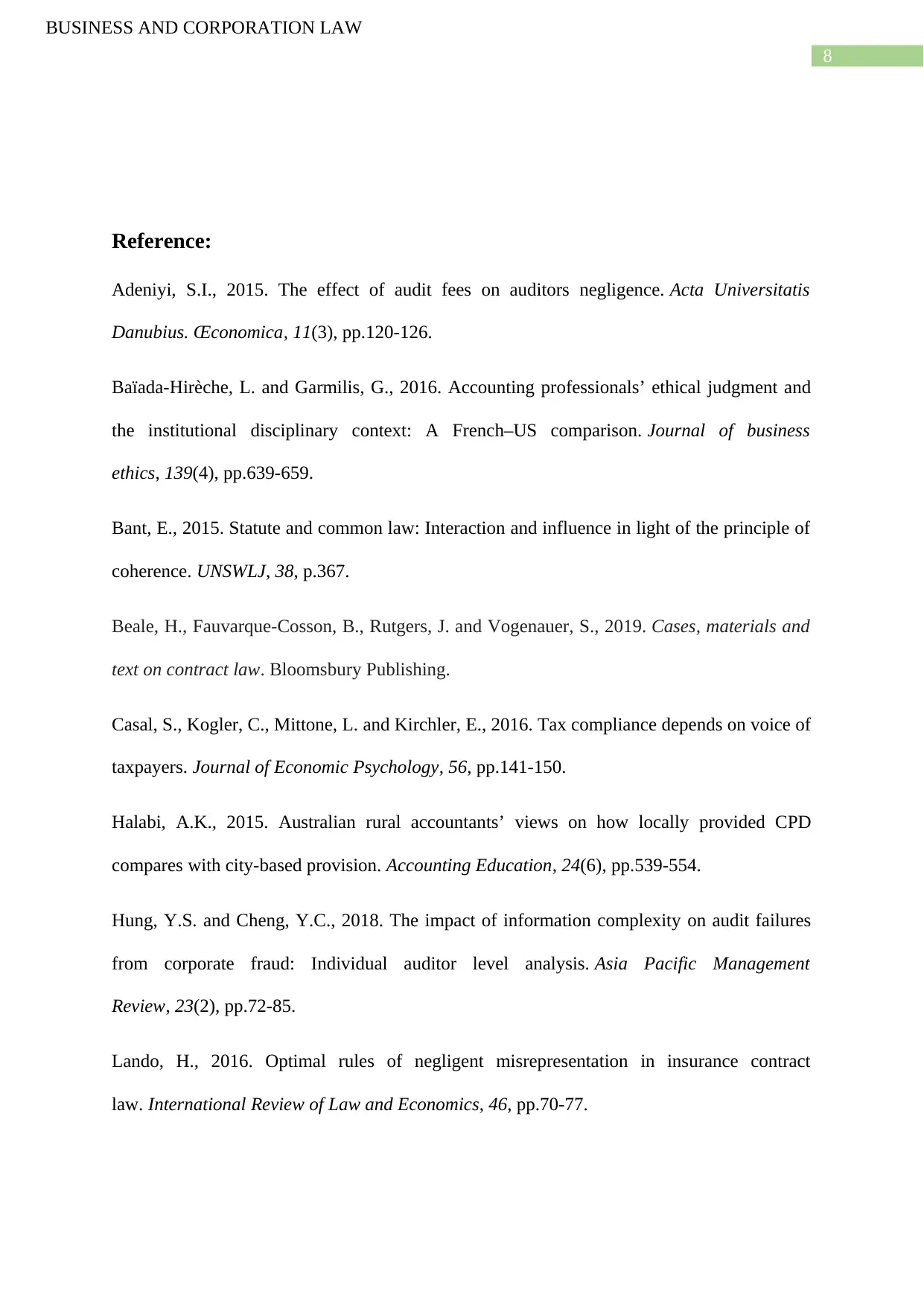
8
BUSINESS AND CORPORATION LAW
Reference:
Adeniyi, S.I., 2015. The effect of audit fees on auditors negligence. Acta Universitatis
Danubius. Œconomica, 11(3), pp.120-126.
Baïada-Hirèche, L. and Garmilis, G., 2016. Accounting professionals’ ethical judgment and
the institutional disciplinary context: A French–US comparison. Journal of business
ethics, 139(4), pp.639-659.
Bant, E., 2015. Statute and common law: Interaction and influence in light of the principle of
coherence. UNSWLJ, 38, p.367.
Beale, H., Fauvarque-Cosson, B., Rutgers, J. and Vogenauer, S., 2019. Cases, materials and
text on contract law. Bloomsbury Publishing.
Casal, S., Kogler, C., Mittone, L. and Kirchler, E., 2016. Tax compliance depends on voice of
taxpayers. Journal of Economic Psychology, 56, pp.141-150.
Halabi, A.K., 2015. Australian rural accountants’ views on how locally provided CPD
compares with city-based provision. Accounting Education, 24(6), pp.539-554.
Hung, Y.S. and Cheng, Y.C., 2018. The impact of information complexity on audit failures
from corporate fraud: Individual auditor level analysis. Asia Pacific Management
Review, 23(2), pp.72-85.
Lando, H., 2016. Optimal rules of negligent misrepresentation in insurance contract
law. International Review of Law and Economics, 46, pp.70-77.
BUSINESS AND CORPORATION LAW
Reference:
Adeniyi, S.I., 2015. The effect of audit fees on auditors negligence. Acta Universitatis
Danubius. Œconomica, 11(3), pp.120-126.
Baïada-Hirèche, L. and Garmilis, G., 2016. Accounting professionals’ ethical judgment and
the institutional disciplinary context: A French–US comparison. Journal of business
ethics, 139(4), pp.639-659.
Bant, E., 2015. Statute and common law: Interaction and influence in light of the principle of
coherence. UNSWLJ, 38, p.367.
Beale, H., Fauvarque-Cosson, B., Rutgers, J. and Vogenauer, S., 2019. Cases, materials and
text on contract law. Bloomsbury Publishing.
Casal, S., Kogler, C., Mittone, L. and Kirchler, E., 2016. Tax compliance depends on voice of
taxpayers. Journal of Economic Psychology, 56, pp.141-150.
Halabi, A.K., 2015. Australian rural accountants’ views on how locally provided CPD
compares with city-based provision. Accounting Education, 24(6), pp.539-554.
Hung, Y.S. and Cheng, Y.C., 2018. The impact of information complexity on audit failures
from corporate fraud: Individual auditor level analysis. Asia Pacific Management
Review, 23(2), pp.72-85.
Lando, H., 2016. Optimal rules of negligent misrepresentation in insurance contract
law. International Review of Law and Economics, 46, pp.70-77.
⊘ This is a preview!⊘
Do you want full access?
Subscribe today to unlock all pages.

Trusted by 1+ million students worldwide
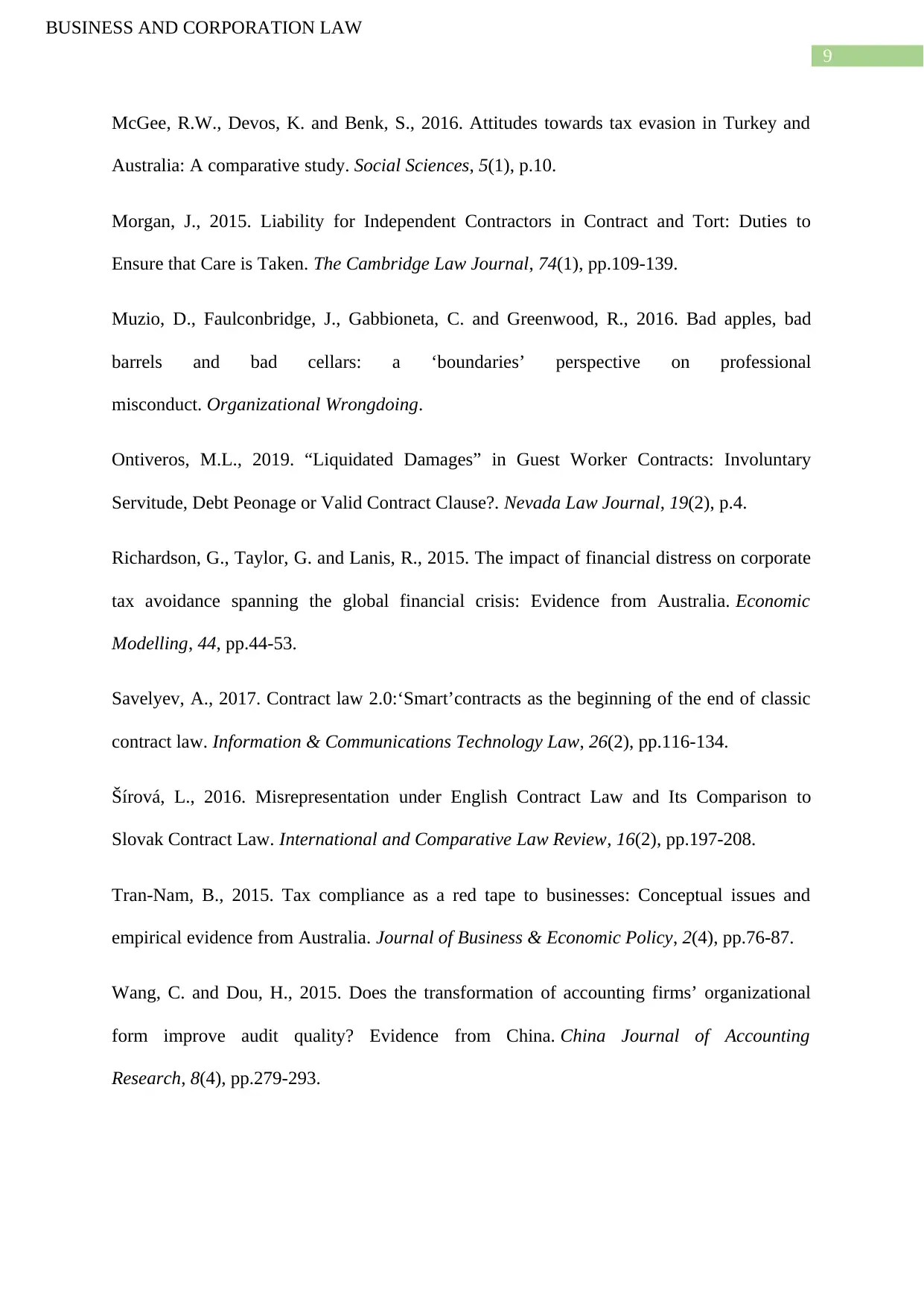
9
BUSINESS AND CORPORATION LAW
McGee, R.W., Devos, K. and Benk, S., 2016. Attitudes towards tax evasion in Turkey and
Australia: A comparative study. Social Sciences, 5(1), p.10.
Morgan, J., 2015. Liability for Independent Contractors in Contract and Tort: Duties to
Ensure that Care is Taken. The Cambridge Law Journal, 74(1), pp.109-139.
Muzio, D., Faulconbridge, J., Gabbioneta, C. and Greenwood, R., 2016. Bad apples, bad
barrels and bad cellars: a ‘boundaries’ perspective on professional
misconduct. Organizational Wrongdoing.
Ontiveros, M.L., 2019. “Liquidated Damages” in Guest Worker Contracts: Involuntary
Servitude, Debt Peonage or Valid Contract Clause?. Nevada Law Journal, 19(2), p.4.
Richardson, G., Taylor, G. and Lanis, R., 2015. The impact of financial distress on corporate
tax avoidance spanning the global financial crisis: Evidence from Australia. Economic
Modelling, 44, pp.44-53.
Savelyev, A., 2017. Contract law 2.0:‘Smart’contracts as the beginning of the end of classic
contract law. Information & Communications Technology Law, 26(2), pp.116-134.
Šírová, L., 2016. Misrepresentation under English Contract Law and Its Comparison to
Slovak Contract Law. International and Comparative Law Review, 16(2), pp.197-208.
Tran-Nam, B., 2015. Tax compliance as a red tape to businesses: Conceptual issues and
empirical evidence from Australia. Journal of Business & Economic Policy, 2(4), pp.76-87.
Wang, C. and Dou, H., 2015. Does the transformation of accounting firms’ organizational
form improve audit quality? Evidence from China. China Journal of Accounting
Research, 8(4), pp.279-293.
BUSINESS AND CORPORATION LAW
McGee, R.W., Devos, K. and Benk, S., 2016. Attitudes towards tax evasion in Turkey and
Australia: A comparative study. Social Sciences, 5(1), p.10.
Morgan, J., 2015. Liability for Independent Contractors in Contract and Tort: Duties to
Ensure that Care is Taken. The Cambridge Law Journal, 74(1), pp.109-139.
Muzio, D., Faulconbridge, J., Gabbioneta, C. and Greenwood, R., 2016. Bad apples, bad
barrels and bad cellars: a ‘boundaries’ perspective on professional
misconduct. Organizational Wrongdoing.
Ontiveros, M.L., 2019. “Liquidated Damages” in Guest Worker Contracts: Involuntary
Servitude, Debt Peonage or Valid Contract Clause?. Nevada Law Journal, 19(2), p.4.
Richardson, G., Taylor, G. and Lanis, R., 2015. The impact of financial distress on corporate
tax avoidance spanning the global financial crisis: Evidence from Australia. Economic
Modelling, 44, pp.44-53.
Savelyev, A., 2017. Contract law 2.0:‘Smart’contracts as the beginning of the end of classic
contract law. Information & Communications Technology Law, 26(2), pp.116-134.
Šírová, L., 2016. Misrepresentation under English Contract Law and Its Comparison to
Slovak Contract Law. International and Comparative Law Review, 16(2), pp.197-208.
Tran-Nam, B., 2015. Tax compliance as a red tape to businesses: Conceptual issues and
empirical evidence from Australia. Journal of Business & Economic Policy, 2(4), pp.76-87.
Wang, C. and Dou, H., 2015. Does the transformation of accounting firms’ organizational
form improve audit quality? Evidence from China. China Journal of Accounting
Research, 8(4), pp.279-293.
1 out of 10
Your All-in-One AI-Powered Toolkit for Academic Success.
+13062052269
info@desklib.com
Available 24*7 on WhatsApp / Email
![[object Object]](/_next/static/media/star-bottom.7253800d.svg)
Unlock your academic potential
Copyright © 2020–2026 A2Z Services. All Rights Reserved. Developed and managed by ZUCOL.